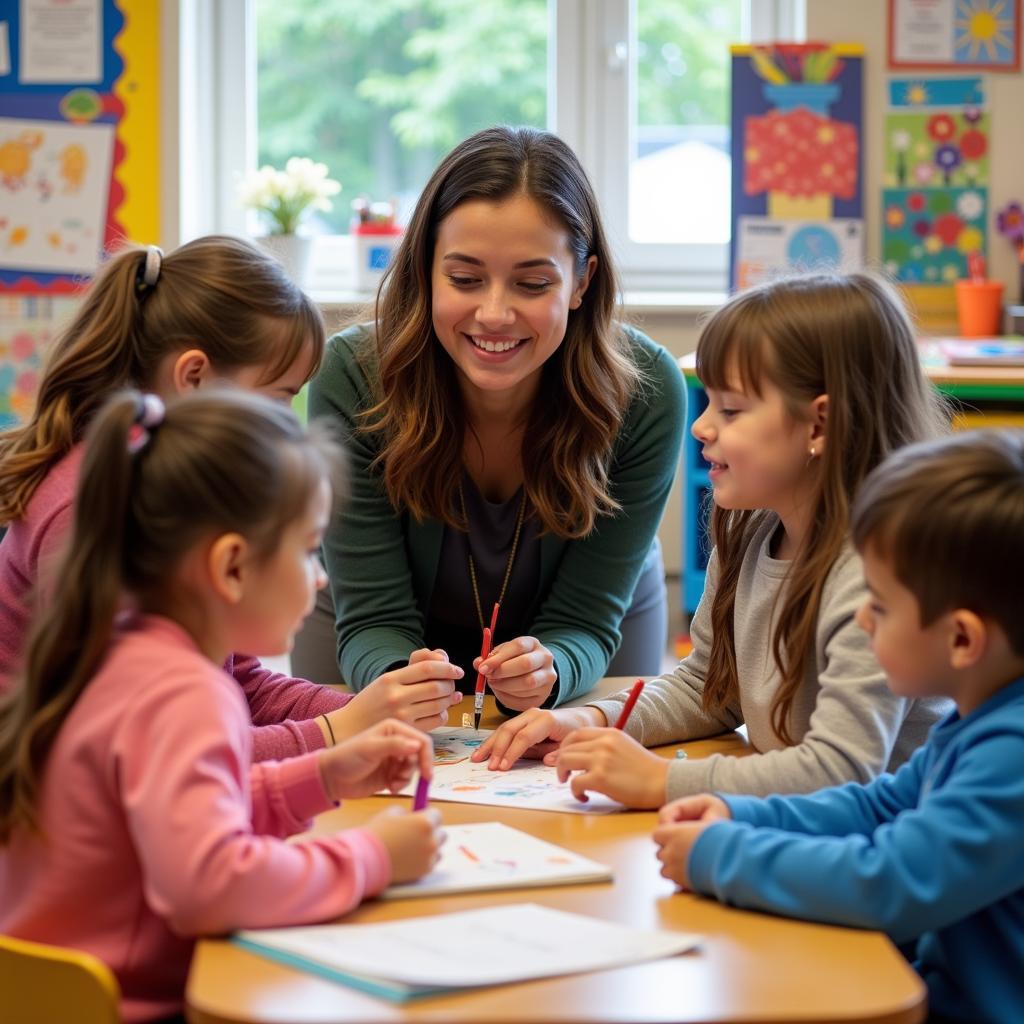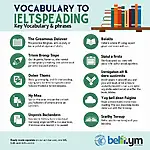In IELTS Speaking tests, candidates often encounter questions about people and their characteristics. One popular topic is describing someone who is good with children. This theme has appeared frequently in past exams and is likely to remain relevant in future tests. Let’s explore how to effectively answer such questions and achieve a high score.
describe a recent family tradition you celebrated
Part 1: Introduction and Interview
In this section, the examiner may ask general questions about children and your experiences with them. Here are some possible questions:
- Do you like children?
- Have you ever worked with children?
- What qualities do you think are important for someone who works with children?
Let’s look at a sample answer for the third question:
Sample Answer (Band 8-9):
“I believe that patience and empathy are crucial qualities for anyone working with children. Children can be unpredictable and require a lot of attention, so being able to remain calm and understanding in various situations is essential. Additionally, having a creative mindset and the ability to communicate effectively at their level are important traits. These qualities help in engaging children and fostering their development in a positive way.”
Part 2: Long Turn
Here’s a sample cue card related to describing a person who is good with children:
Describe a person you know who is good with children.
You should say:
- Who this person is
- How you know this person
- What they do with children
- And explain why you think this person is good with children
Sample Answer (Band 6-7):
“I’d like to talk about my aunt Sarah, who is really great with kids. She’s my mom’s younger sister, and I’ve known her my whole life. Sarah works as a kindergarten teacher in my hometown.
When she’s with children, Sarah always has fun activities planned. She likes to play games, read stories, and do arts and crafts with them. I’ve seen her at family gatherings where she keeps all the kids entertained for hours.
I think Sarah is good with children because she’s patient and understanding. She never gets angry when kids make mistakes or misbehave. Instead, she talks to them calmly and explains things in a way they can understand. She also has a good sense of humor and can make children laugh easily.
Another reason why Sarah is great with kids is that she treats them with respect. She listens to what they have to say and takes their opinions seriously. This helps children feel valued and builds their confidence.
Overall, I believe Sarah’s natural ability to connect with children, combined with her experience as a teacher, makes her exceptional at handling kids of all ages.”
Sample Answer (Band 8-9):
“I’d like to talk about my colleague, David, who has an exceptional talent for interacting with children. I’ve had the pleasure of working alongside him at a local community center for the past three years, where we organize various youth programs.
David’s approach to engaging with children is truly remarkable. He has an innate ability to create a warm and welcoming atmosphere that instantly puts kids at ease. Whether he’s leading a group activity or providing one-on-one mentoring, David consistently demonstrates a perfect balance of authority and approachability.
One of the most striking aspects of David’s interaction with children is his knack for adapting his communication style to suit different age groups and personalities. He effortlessly switches between using simple language for younger kids and more complex explanations for older ones, ensuring that everyone feels included and understood.
I believe David excels with children for several reasons. Firstly, his boundless patience is evident in how he handles challenging situations, never losing his cool even when faced with difficult behavior. Secondly, his genuine enthusiasm for fostering children’s growth is contagious, inspiring kids to participate actively and learn eagerly.
Moreover, David possesses an extraordinary empathy that allows him to intuitively understand children’s needs and concerns. He’s always ready with a reassuring word or a comforting gesture, which helps children feel safe and valued.
In conclusion, David’s combination of natural talent, honed skills, and sincere dedication to children’s well-being makes him an outstanding role model and a true asset in any child-centered environment.”
 Person interacting with children in a fun and engaging way
Person interacting with children in a fun and engaging way
Follow-up Questions:
- What challenges might someone face when working with children?
- How has childcare changed in recent years in your country?
Sample Answer for Question 1 (Band 8-9):
“Working with children can present several significant challenges. One of the primary difficulties is managing diverse personalities and learning styles within a group. Each child is unique, and adapting teaching methods or care strategies to suit individual needs requires considerable skill and flexibility.
Another challenge is maintaining discipline while fostering a positive, nurturing environment. Striking the right balance between setting boundaries and allowing freedom for exploration can be quite demanding.
Additionally, keeping up with children’s energy levels and constantly engaging their attention can be physically and mentally exhausting. This requires boundless patience and creativity to continually come up with new, stimulating activities.
Lastly, effective communication with both children and their parents can be challenging. It’s crucial to convey information clearly to children while also addressing parents’ concerns and expectations professionally. This dual communication role requires exceptional interpersonal skills and the ability to adapt one’s communication style appropriately.”
Part 3: Two-way Discussion
In this section, the examiner will ask more abstract questions related to the topic. Here are some potential questions and sample answers:
Examiner: How has technology affected the way children learn and play?
Sample Answer (Band 6-7):
“Technology has changed a lot about how kids learn and play these days. Many children now use tablets or computers for educational games and apps, which can make learning more fun and interactive. They can also access a lot of information quickly on the internet, which wasn’t possible before.
For play, video games and online activities have become very popular. This means kids might spend less time playing outside or with physical toys. While technology can be good for learning new skills, some people worry that children might not develop social skills as well if they spend too much time with devices.”
Sample Answer (Band 8-9):
“Technology has profoundly transformed the landscape of children’s learning and play in recent years. On the educational front, we’ve seen a significant shift towards digital platforms, with interactive learning apps and online resources supplementing traditional teaching methods. This has democratized access to information and allowed for more personalized learning experiences, catering to different learning styles and paces.
However, this digital revolution also presents challenges. While technology offers unprecedented opportunities for cognitive development and skill acquisition, there are concerns about its impact on attention spans and critical thinking abilities. The instant gratification often associated with digital media might affect children’s patience and perseverance in tackling complex problems.
In terms of play, technology has redefined leisure activities for many children. Virtual worlds and online games offer rich, immersive experiences that can foster creativity and problem-solving skills. Yet, this shift has led to apprehensions about decreased physical activity and face-to-face social interactions, which are crucial for holistic development.
Ultimately, the key lies in striking a balance. When used judiciously, technology can be a powerful tool for enhancing learning and play. However, it’s essential to complement digital experiences with traditional forms of learning and physical play to ensure well-rounded development in children.”
describe a time you helped a friend through a challenge
Key Vocabulary and Phrases for High Scores
To achieve a high score in IELTS Speaking when describing someone good with children, consider using these advanced vocabulary items and phrases:
-
Nurturing /ˈnɜːtʃərɪŋ/ (adjective): Providing care and encouragement for growth and development.
Example: “Her nurturing approach helps children feel safe and supported.” -
Empathetic /ˌempəˈθetɪk/ (adjective): Able to understand and share the feelings of others.
Example: “His empathetic nature allows him to connect with children on an emotional level.” -
To have a way with (idiom): To be skillful or talented in dealing with something or someone.
Example: “She really has a way with children; they always respond positively to her.” -
Child-centered /tʃaɪld ˈsentəd/ (adjective): Focusing on the needs and interests of children.
Example: “The teacher’s child-centered approach ensures that each student feels valued.” -
To foster /ˈfɒstə(r)/ (verb): To encourage or promote the development of something.
Example: “He fosters creativity by encouraging children to express themselves through art.”
 Child-centered learning environment with engaged students
Child-centered learning environment with engaged students
Examiner’s Advice
To excel in the IELTS Speaking test when describing someone good with children:
- Use specific examples to illustrate the person’s skills and qualities.
- Employ a range of descriptive adjectives to paint a vivid picture of the person’s interactions with children.
- Discuss both personality traits and practical skills that make the person effective with children.
- Reflect on the impact this person has on children’s development and well-being.
- Practice speaking about this topic using varied vocabulary and complex sentence structures to improve fluency and coherence.
Remember, the key to a high score is not just what you say, but how you say it. Aim for clear pronunciation, natural intonation, and a confident delivery.
describe a food you disliked as a child but enjoy now
By following these guidelines and incorporating the suggested vocabulary and phrases, you’ll be well-prepared to discuss this topic effectively in your IELTS Speaking test.


